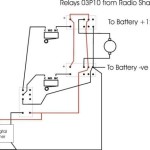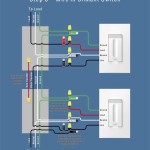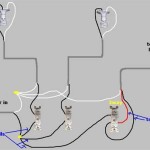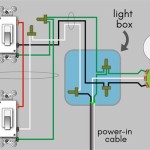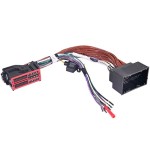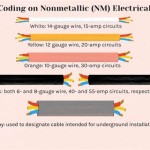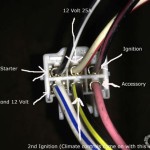A Guitar Wiring Kit is a comprehensive set of electrical components and wiring materials designed to replace or upgrade the wiring system within an electric guitar. It provides all the necessary parts to rewire the instrument’s pickups, controls, and output jack, ensuring optimal electrical performance and sound quality.
Wiring kits offer several benefits. They allow for the customization of the guitar’s wiring to suit the player’s specific preferences, such as tone, volume, and switching configurations. They also provide a cost-effective solution for repairing or replacing faulty wiring, ensuring the guitar’s electrical system is functioning correctly.
A significant historical development was the introduction of pre-wired pickguard assemblies. These assemblies feature the entire wiring system pre-installed on a pickguard, simplifying the installation process and reducing the risk of wiring errors.
As we delve into this article, we will explore the various types of Guitar Wiring Kits, their components, installation procedures, and their overall impact on the performance and sound of an electric guitar.
Understanding the essential aspects of a Guitar Wiring Kit is crucial for guitarists and luthiers alike. These aspects influence the functionality, sound quality, and overall performance of an electric guitar.
- Components: The kit includes essential electrical components such as potentiometers, capacitors, resistors, and a pickup selector switch.
- Wiring Materials: High-quality wiring materials like shielded cables and solder ensure optimal signal transfer and minimize noise.
- Customizability: Wiring kits allow for customization of the guitar’s wiring to suit the player’s preferences, such as pickup configurations and tone shaping.
- Installation: The installation process requires soldering skills and an understanding of guitar wiring schematics.
- Pre-wired Assemblies: Pre-wired pickguard assemblies simplify the installation process for beginners or those seeking a professional-grade setup.
- Troubleshooting: Wiring kits aid in troubleshooting and repairing electrical issues within the guitar.
- Sound Quality: The quality of the wiring kit directly impacts the guitar’s sound quality, affecting tone, clarity, and sustain.
- Compatibility: Wiring kits are designed to be compatible with specific guitar models or pickup configurations, ensuring proper fit and functionality.
These aspects collectively contribute to the overall performance and playability of an electric guitar. Understanding and addressing these aspects empowers guitarists and luthiers to optimize their instrument’s sound and functionality.
Components
Electrical components are the heart of a guitar’s wiring system. They determine the sound, functionality, and overall performance of the instrument. A comprehensive Guitar Wiring Kit will include a range of essential electrical components, each playing a specific role in shaping the guitar’s electrical characteristics.
- Potentiometers: These variable resistors control the volume and tone of the guitar’s pickups. They come in different values, allowing for a wide range of tonal possibilities.
- Capacitors: Capacitors filter out unwanted frequencies and smooth out the guitar’s sound. They are used in conjunction with potentiometers to create tone shaping circuits.
- Resistors: Resistors limit the flow of current in the circuit, affecting the guitar’s overall volume and tone. They are also used to create voltage dividers and bias circuits.
- Pickup Selector Switch: This switch allows the guitarist to select between different pickup configurations, such as neck, bridge, or both pickups combined. It is an essential component for guitars with multiple pickups.
The quality and specifications of these components directly impact the guitar’s sound and playability. Upgrading or replacing these components can significantly enhance the performance and versatility of the instrument. Understanding the role of each component empowers guitarists and luthiers to customize and optimize their guitar’s wiring system for their specific needs and preferences.
Wiring Materials
In the realm of Guitar Wiring Kits, wiring materials play a crucial role in ensuring pristine signal transfer and minimizing unwanted noise. High-quality cables and solder form the backbone of an efficient electrical system, directly influencing the guitar’s sound and performance.
- Shielded Cables: These cables are constructed with an insulating layer and a conductive shield, typically made of copper or aluminum foil. The shield acts as a barrier against electromagnetic interference (EMI) and radio frequency interference (RFI), preventing external noise from seeping into the guitar’s signal. Shielded cables are essential for maintaining a clean and noise-free sound, especially in environments with high levels of electrical interference.
- Low-Capacitance Cables: Capacitance refers to the ability of a cable to store electrical charge. In guitar wiring, low-capacitance cables are preferred as they minimize signal loss and preserve the guitar’s natural tone. High-capacitance cables can lead to a dull or muffled sound, especially when used with vintage-style pickups.
- High-Quality Solder: Solder is a metal alloy used to create electrical connections between components. In guitar wiring, rosin-core solder is commonly used due to its ease of use and reliable performance. High-quality solder ensures strong and durable connections, minimizing the risk of intermittent connections and noise caused by poor soldering.
- Proper Soldering Techniques: Beyond the quality of the solder itself, proper soldering techniques are crucial for achieving optimal signal transfer. This includes using a clean soldering iron, applying the correct amount of solder, and ensuring that the connections are secure and free of cold solder joints.
Collectively, these wiring materials work together to create a robust and efficient electrical system within the guitar. High-quality shielded cables, low-capacitance cables, and proper soldering techniques ensure that the guitar’s signal is transmitted cleanly and efficiently, resulting in optimal sound quality, minimal noise, and enhanced playability.
Customizability
Customizability is a cornerstone of Guitar Wiring Kits, empowering guitarists to tailor their instrument’s electrical system to their unique playing style and tonal preferences. This flexibility extends to various aspects of the guitar’s wiring, including pickup configurations, tone shaping circuits, and switching options.
- Pickup Configurations: Wiring kits enable guitarists to experiment with different pickup configurations, such as single-coil, humbucker, or a combination of both. By altering the wiring, players can achieve a wide range of tones, from vintage warmth to modern high-output aggression.
- Tone Shaping Circuits: The values of potentiometers, capacitors, and resistors within the wiring kit can be adjusted to create custom tone shaping circuits. This allows guitarists to fine-tune the guitar’s sound, emphasizing or attenuating specific frequencies to achieve their desired tonal balance.
- Switching Options: Wiring kits provide various switching options, such as pickup selector switches, coil-splitting switches, and phase reversal switches. These switches allow guitarists to quickly and easily change between different pickup configurations and tonal options during performance.
- Unique Wiring Schemes: With a comprehensive wiring kit, guitarists are not limited to traditional wiring schemes. They can explore and implement unique wiring configurations, such as series/parallel switching, varitone circuits, and custom tone controls, to create truly personalized and distinctive guitar sounds.
The customizability offered by Guitar Wiring Kits opens up a world of possibilities for guitarists seeking to optimize their instrument’s sound and functionality. By understanding the components and techniques involved, players can unlock the full potential of their guitars and craft their own unique sonic signature.
Installation
The installation of a Guitar Wiring Kit requires a combination of soldering skills and a thorough understanding of guitar wiring schematics. This process involves replacing or upgrading the electrical components and wiring within an electric guitar, demanding precision and attention to detail to ensure optimal performance and sound quality.
- Soldering Techniques: The installation process relies heavily on soldering, which involves joining electrical components using a metal alloy called solder. Proper soldering techniques are essential to create strong and durable connections, minimizing the risk of intermittent connections or noise caused by poor soldering.
- Wiring Schematics: Guitar wiring schematics provide a visual representation of the electrical connections within the guitar. Understanding how to read and interpret these schematics is crucial for successful installation. Schematics indicate the placement and connections of each component, ensuring that the wiring is done correctly and efficiently.
- Component Identification: Before beginning the installation, it is important to identify and familiarize oneself with the various electrical components included in the wiring kit. This includes potentiometers, capacitors, resistors, and pickup selector switches, each of which plays a specific role in shaping the guitar’s sound and functionality.
- Troubleshooting: During the installation process, unforeseen challenges may arise. Having a basic understanding of guitar wiring and troubleshooting techniques can help identify and resolve any issues that may occur, ensuring a successful installation and optimal performance of the guitar.
Overall, the installation of a Guitar Wiring Kit requires a combination of technical skill, patience, and attention to detail. By understanding the fundamental principles of soldering, interpreting wiring schematics, and familiarizing oneself with the electrical components involved, guitarists and luthiers can confidently undertake this task to upgrade or repair their electric guitars.
Pre-wired Assemblies
Pre-wired assemblies are a convenient and practical solution within the domain of Guitar Wiring Kits. These assemblies feature the entire wiring system pre-installed on a pickguard, significantly simplifying the installation process, reducing the risk of errors, and ensuring a professional-grade setup.
For novice guitar builders or those seeking a hassle-free upgrade, pre-wired assemblies offer several advantages:
- Simplified Installation: Pre-wired assemblies eliminate the need for complex soldering and intricate wiring, making them ideal for beginners or those with limited experience in guitar electronics.
- Reduced Risk of Errors: By eliminating the need for individual component installation and wiring, pre-wired assemblies minimize the chances of incorrect connections or faulty soldering, ensuring a reliable and noise-free performance.
- Professional-Grade Quality: Pre-wired assemblies are often crafted by experienced luthiers or reputable manufacturers, ensuring high-quality components, precise soldering, and optimal performance.
Beyond their ease of installation, pre-wired assemblies offer practical advantages for guitarists and luthiers:
- Time-Saving: Pre-wired assemblies significantly reduce the time required for installation compared to traditional wiring methods, freeing up time for other aspects of guitar building or setup.
- Cost-Effectiveness: While pre-wired assemblies may have a higher upfront cost than individual components, they can be more cost-effective in the long run by eliminating the need for specialized tools, materials, and the potential cost of repairs due to wiring errors.
- Consistency and Reliability: Pre-wired assemblies ensure consistency in wiring and component quality, resulting in reliable performance and tonal consistency across multiple guitars equipped with the same assembly.
In conclusion, pre-wired assemblies within Guitar Wiring Kits provide a simplified, error-reducing, and professional-grade solution for guitarists and luthiers. Their ease of installation, practical advantages, and the assurance of consistent quality make them a valuable choice for both novice builders and experienced professionals seeking to upgrade or repair their electric guitars.
Troubleshooting
Troubleshooting is an essential aspect of maintaining and repairing electric guitars. A Guitar Wiring Kit plays a crucial role in troubleshooting and resolving electrical issues within the guitar, empowering guitarists and luthiers to diagnose and fix problems efficiently.
- Identifying Faulty Components: Guitar Wiring Kits provide a comprehensive set of replacement components, enabling users to swap out potentially faulty parts and test the circuit until the issue is isolated. This process helps identify the specific component responsible for the electrical problem.
- Tracing Wiring Errors: The methodical replacement of components also aids in tracing wiring errors. By systematically testing each connection, guitarists can identify loose wires, shorts, or incorrect wiring, allowing for precise repairs and restoration of proper signal flow.
- Assessing Output Signal: Wiring kits include components such as potentiometers and capacitors that affect the guitar’s output signal. By adjusting these components, guitarists can monitor the signal at various points in the circuit, helping them pinpoint the source of signal loss or distortion.
- Grounding Issues: Improper grounding is a common cause of electrical problems in guitars. Wiring kits provide the necessary components and materials to ensure proper grounding, eliminating unwanted noise and ensuring a clean signal path.
The troubleshooting capabilities provided by Guitar Wiring Kits empower guitarists and luthiers to diagnose and resolve electrical issues within their instruments, ensuring optimal performance and tonal quality. By understanding the components and techniques involved, guitarists can approach troubleshooting with confidence, saving time and money on repairs while enhancing their understanding of their instrument’s electrical system.
Sound Quality
The quality of the wiring kit has a profound effect on the sound quality of an electric guitar. This is because the wiring kit plays a crucial role in transmitting the electrical signals from the guitar’s pickups to the amplifier. A high-quality wiring kit will ensure that the signal is transmitted cleanly and efficiently, resulting in a clear and well-defined sound. Conversely, a low-quality wiring kit can introduce noise and distortion into the signal, resulting in a muddy or muffled sound.
The components of a wiring kit that have the greatest impact on sound quality are the potentiometers, capacitors, and resistors. Potentiometers control the volume and tone of the guitar, while capacitors and resistors filter out unwanted frequencies and smooth out the sound. High-quality potentiometers, capacitors, and resistors will produce a more accurate and consistent sound than low-quality components.
In addition to the quality of the components, the way in which the wiring kit is installed can also affect the sound quality. A poorly installed wiring kit can introduce noise and distortion into the signal, even if the components themselves are of high quality. It is important to have the wiring kit installed by a qualified technician to ensure that it is done correctly.
By using a high-quality wiring kit and having it installed correctly, guitarists can ensure that their guitars sound their best. This is especially important for guitarists who play in professional settings or who record their music.
Compatibility
Compatibility is a critical aspect of Guitar Wiring Kits, ensuring that the kit’s components are suited to the specific characteristics of a guitar’s electrical system. This compatibility involves matching the wiring kit to the guitar’s model, pickup configuration, and other electrical features to guarantee optimal performance and functionality.
- Specific Model Compatibility: Wiring kits are designed for compatibility with specific guitar models, taking into account the unique wiring layouts and component configurations of each model. This ensures that the kit’s components align with the guitar’s body shape, control layout, and pickup arrangement, allowing for a precise and seamless installation.
- Pickup Configuration Matching: Wiring kits are tailored to match different pickup configurations, such as single-coil, humbucker, or a combination of both. The kit’s components, including potentiometers, capacitors, and wiring harnesses, are calibrated to work in conjunction with the specific pickup types, delivering optimal tonal characteristics and switching capabilities.
- Component Specifications: Compatibility also extends to the specifications of the individual components within the wiring kit. Potentiometers, capacitors, and resistors are carefully selected to match the electrical requirements of the guitar’s pickups and controls. This ensures proper signal flow, volume and tone adjustment, and overall sound quality.
- Pre-Wired Assemblies: For added convenience, some wiring kits come as pre-wired assemblies, where the components are already soldered onto a pickguard or control plate. These assemblies are designed to be directly compatible with specific guitar models, simplifying the installation process and ensuring a hassle-free upgrade.
By ensuring compatibility between the wiring kit and the guitar, guitarists can achieve a well-functioning electrical system that enhances the instrument’s playability, sound quality, and reliability. Compatibility is fundamental to unlocking the full potential of a Guitar Wiring Kit and tailoring it to the unique needs of a particular guitar.










Related Posts


